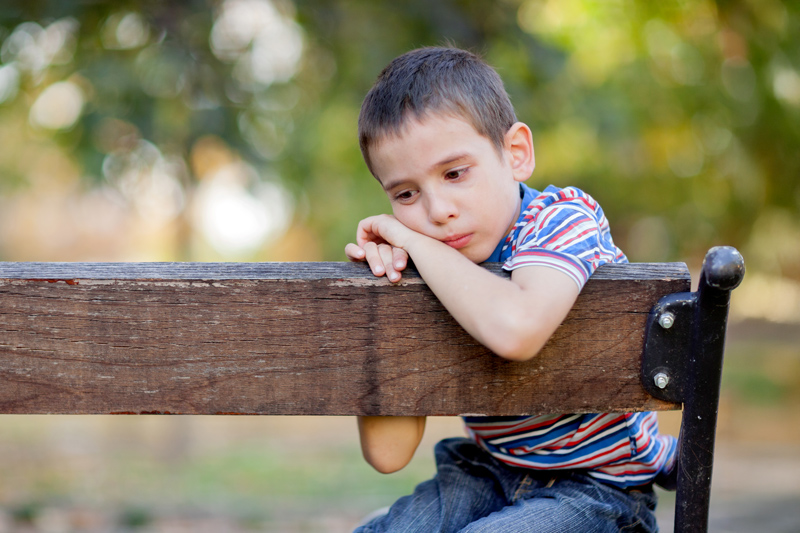Family separation is a traumatic experience for children, regardless of the cause. When separation occurs due to parental mental illness or incarceration, children face unique psychological and systemic challenges that are often overlooked. Both groups experience disenfranchised grief, attachment disruptions, and long-term socioeconomic consequences. However, what’s striking is how society treats these separations differently—mental health-related separations are framed as ‘protective,’ while incarceration-related separations are seen as punitive. This societal framing needs to be critically examined and shifted.

This brief report examines the individual and systemic impacts of childhood separation, comparing the experiences of children of parents with mental illness to those with parents that were incarcerated. Both groups are disproportionately affected by poverty, bias in child welfare systems, and inadequate policy responses. By analyzing these parallels, we underscore the urgent need for comprehensive systemic reforms that prioritize children’s developmental needs and provide the necessary support for their families.
Defining Family Separation in Mental Health and Incarceration Contexts
Separation Due to Parental Mental Illness
Children may be separated from parents with mental illness through:
- Involuntary psychiatric hospitalization (Murphy et al., 2017; Reupert et al., 2021; Slade et al., 2022).
- Child welfare interventions (Gambrill & Shlonsky, 2001).
- Informal kinship care arrangements (Reupert et al., 2021).
Unlike previous high-profile cases of border-related family separations (Lobel, 2020), mental health-related separations lack standardized terminology or tracking mechanisms (Bragg Acker, 2024). The Adverse Childhood Experiences (ACE) Study (Felitti et al., 1998/2019) includes parental mental illness but does not distinguish between co-residence and separation, masking the unique trauma of removal.
Separation Due to Parental Incarceration
An estimated 2.7 million U.S. children have a parent who is incarcerated (Simmons, 2000). Separation occurs through:
- Detention and imprisonment (Rojas-Flores et al., 2017).
- Foster care placement when no caregiver is available (Roberts, 2022).
- Restricted visitation due to carceral policies (Zayas, 2015).
Unlike mental health separations, parental incarceration is explicitly listed in the ACE questionnaire. However, systemic responses often fail to address children’s emotional needs, focusing instead on punitive measures (Human Rights Watch, 2022, 2023).
Individual-Level Impacts: Attachment and Grief
Attachment Disruption
Bowlby’s (1969) attachment theory demonstrates that early separations impair emotional development. Studies on children separated from their parents exhibited:
- Higher rates of insecure attachment (Firestone, 2018).
- Lifelong anxiety and depression (Rusby & Tasker, 2009).
- Similarly, children of incarcerated parents often develop:
- Fear of abandonment (Rojas-Flores et al., 2017).
- Difficulty forming trusting relationships (Simmons, 2000).
For children of parents with mental illness, separations are often sudden and unexplained, compounding trauma. According to Metz & Jungbauer, 2021:
“More than half of the children were burdened with profound feelings of guilt. Especially in early childhood, they often believed that they were to blame for their parents’ psychological problems, such as feeling as if they had done something wrong” (p. 68).
Disenfranchised Grief
Doka (2002) defines disenfranchised grief as unacknowledged loss occurring when:
- The relationship is not recognized (e.g., society assumes children are “better off” without a parent with mental illness or a parent incarcerated).
- The loss is invalidated (e.g., separation is framed as necessary rather than traumatic).
- The child’s capacity to grieve is ignored (e.g., adults assume children “will forget”).
Both groups internalize societal messages that their grief is unworthy of acknowledgment, leading to suppressed emotions (Murphy et al., 2017) and delayed mental health struggles (Zoll, 2019).
Systemic-Level Impacts: Bias and Structural Harm
Child Welfare and Racial Disparities
The U.S. child welfare system disproportionately targets low-income Black and Indigenous families (Human Rights Watch, 2022). Key systemic biases include:
- 75% of child welfare cases involve “neglect” tied to poverty (ACLU, 2019).
- Parents with mental illness are automatically flagged as high-risk (Gambrill & Shlonsky, 2001).
- Children of parents who are incarcerated are 5 times more likely to enter foster care (Roberts, 2022).
Long-Term Consequences of Removal
Research shows that children removed from their homes are more likely to face:

These outcomes suggest that systemic interventions often cause more harm than the original family circumstances.
Recommendations for Policy and Practice
- Family Preservation Policies
- Provide mental health support to prevent unnecessary removals (Slade et al., 2022).
- Expanding community-based mental health support to help parents manage crises without losing custody.
- Expand and reform visitation programs for parents incarcerated to maintain parent-child bond (Zayas, 2015).
- Trauma-Informed Interventions
- Train child welfare workers to recognize disenfranchised grief (Doka, 2002).
- Provide trauma-informed care and support for separated children (Murphy et al., 2017).
- Systemic Reforms
- Track separation outcomes in mental health and carceral systems.
- Invest in alternatives to removal, such as kinship care and wraparound services, to support families and children.
- Challenge biases linking mental illness and incarceration to unfit parenting (Reupert et al., 2021).
Most importantly, we must listen to those most affected – adults who endured childhood separation, who can speak to what would have helped them heal. Their insights, long ignored, hold the key to creating systems that truly protect children.
Conclusion
The trauma of childhood separation lingers long after the event itself. Whether caused by mental health systems or incarceration, these separations leave children with wounds that society too often refuses to see. By acknowledging these parallels—and the systemic failures that enable them—we can begin to build approaches that prioritize healing over punishment and connection over isolation.
Acknowledgments
In Memoriam: This manuscript is based on a literature review developed initially by Cheri Bragg Acker. This submission is dedicated to the Memory of Cheri Bragg Acker (12/31/1967-12/17/2024), daughter of a mom with mental illness and advocate and leader in the rights of families and children separated from parents with mental illness and parents incarcerated.
Cheri A. Bragg Acker, BA, MSW, was the Creator of Family Lived Experience Initiatives at the Yale Program for Recovery and Community Health, Yale School of Medicine, Department of Psychiatry.
Paul Acker is a Consultant with the Yale Program for Recovery and Community Health, Yale School of Medicine, Department of Psychiatry.
Chyrell D. Bellamy, PhD, MSW, is the Director of the Yale Program for Recovery and Community Health and a Professor in the Yale School of Medicine, Department of Psychiatry.
For more information, please contact Chyrell D. Bellamy, PhD, at chyrell.bellamy@yale.edu. She is a Professor at the Yale School of Medicine, Department of Psychiatry, and serves as the Associate Director of Education Programs at the Yale Center for Clinical Investigation (YCCI). Dr. Bellamy also directs several programs at the Yale Program for Recovery and Community Health (PRCH), including Peer Support Services and Research and the LET(s)Lead Academy. Her mailing address is: Yale Program for Recovery and Community Health (PRCH), Erector Square, 319 Peck Street, Building 1, New Haven, CT 06513. She can be reached by office phone at (203) 764-8693, cell at (203) 444-2219, or fax at (203) 764-7595.
References
American Civil Liberties Union (ACLU). (2018). Family Separation By the Numbers. https://www.aclu.org/news/immigrants-rights/family-separation-by-the-numbers October 2, 2018.
Bowlby, J. (1969). Attachment and loss: Vol. 1. Attachment. Basic Books.
Bragg Acker, C. (2024). Adult reflections on childhood separation from parent(s) with mental health concerns. Unpublished manuscript.
Doka, K. (Eds.). (2002). Disenfranchised grief: New directions, challenges, and strategies for practice. Champaign, IL: Research Press.
Doyle Jr, J. J. (2007). Child protection and child outcomes: Measuring the effects of foster care. American Economic Review, 97(5), 1583–1610.
Doyle Jr, J. J. (2008). Child protection and adult crime: Using investigator assignments to estimate causal effects of foster care. Journal of Political Economy, 116(4), 746–770.
Felitti, V. J., Anda, R. F., Nordenberg, D., Williamson, D. F., Spitz, A. M., Edwards, V., … & Marks, J. S. (1998/2019). Reprint of: Relationship of childhood abuse and household dysfunction to many of the leading causes of death in Adults: the Adverse Childhood Experiences (ACE) study. American Journal of Preventive Medicine, 56(6), 774–786.
Firestone, L. (2018). The Dangers of Separating Children from Parents: What history & attachment research tell us about the consequences of separation, Psychology Today.com. The Dangers of Separating Children from Parents, Psychology Today, June 26, 2018.
Human Rights Watch (2022). U.S. Child Welfare System Harms Families: Disproportionate Separation in Black, Indigenous Communities, U.S.: Child Welfare System Harms Families, Human Rights Watch (hrw.org) November 17, 2022 hrw.org/news/2022/11/17/us-child-welfare-system-harms-families
Human Rights Watch. (2023). Children separated from families. https://www.hrw.org/topic/childrens-rights/children-separated-from-families
Lowenstein, M. (2022). Sentencing explanations provided via judicial remarks made within the English magistrates’ youth court: Towards a better global understanding. Youth Justice, 22(2), 189–205.
Metz, D., & Jungbauer, J. (2021). “My scars remain forever”: A qualitative study on biographical developments in adult children of parents with mental illness. Clinical Social Work Journal, 49(1), 64-76.
Murphy, G., Peters, K., Wilkes, L., & Jackson, D. (2017). Adult children of parents with mental illness: Navigating stigma. Child & Family Social Work, 22(1), 330–338.
Naseh, M., Zeng, Y., Ahn, E., Cohen, F., & Rfat, M. (2024). Mental Health Implications of Family Separation Associated with Migration Policies in the United States: A Systematic Review. Social Science and Medicine, 352, Article 116995. https://doi.org/10.1016/j.socscimed.2024.116995
Reupert, A., Gladstone, B., Helena Hine, R., Yates, S., McGaw, V., Charles, G., … & Foster, K. (2021). Stigma in relation to families living with parental mental illness: An integrative review. International Journal of Mental Health Nursing, 30(1), 6–26. https://doi.org/10.1111/inm.12820
Roberts, D. (2022). Torn apart: How the child welfare system destroys black families–and how abolition can build a safer world. Basic Books.
Rojas-Flores, L., Clements, M. L., Hwang Koo, J., & London, J. (2017). Trauma and psychological distress in Latino citizen children following parental detention and deportation. Psychological Trauma: Theory, Research, Practice, and Policy, 9(3), 352–361.
Ryan, J. P., & Testa, M. F. (2005). Child maltreatment and juvenile delinquency: Investigating the role of placement and placement instability. Children and Youth Services Review, 27(3), 227–249.
Simmons, C. W. (2000). Children of Incarcerated Parents. California Research Bureau Note, 7 (n.2).
Slade, M., Oades, L., & Jomeen, J. (2022). Parental mental health and child welfare: A systematic review of policies and interventions. Children and Youth Services Review, 136, 106422. https://doi.org/10.1016/j.childyouth.2022.106422
Zayas, L. H. (2015). Forgotten Citizens: Deportation, children, and the making of American exiles and orphans. Oxford University Press.
Zoll, L. (2019, Winter). Disenfranchised Grief: When grief and grievers are unrecognized. The New Social Worker. socialworker.com/feature-articles/practice/disenfranchised-grief-when-grief-and-grievers-are-unrecogniz/






